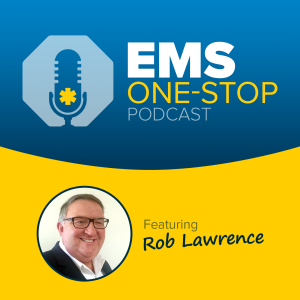
Thursday Jan 26, 2023
Dr. Dave Williams: 12 questions to learn about your system
This episode of EMS One-Stop with Rob Lawrence is brought to you by Lexipol, the experts in policy, training, wellness support and grants assistance for first responders and government leaders. To learn more, visit lexipol.com.
In a recent blog post, Dave Williams, PhD, noted that half to two-thirds of Dallas city general funds are dedicated to police, fire and EMS. With significant tax dollar investments, elected officials, community leaders, and the media want to be good stewards. Still, they are frequently not equipped with the knowledge or data to determine if their services are built to get results and where there are opportunities for improvement.
In this week’s podcast, host Rob Lawrence sat down with EMS thought leader, Dr. Dave Williams, to discuss and identify the 12 questions local leaders can use to learn about their communities. Each point discussed should generate ideas for more learning and improvement both inside an organization and for those citizens and elected officials that surround it.
Top quotes from this episode
“I have been to dozens of ambulance systems around the world and met with leaderships teams and I can count on one hand the number of times they started by talking to me about their clinical outcomes.”
“Almost all of your staff are not your generation … which means they have a totally different value system and a totally different prioritization of things.”
“One of your real powers is to be able to help your community and its leaders understand what’s happening in it. The data that you have is a huge enabler for others to be able to change policy.”
Additional resources on this topic
- Williams’ Blog
- To Err is Human: Building a Safer Health System
- The EMS workforce: Critical condition! Why right-sizing EMS response is crucial to increasing pay and improving work-life balance
- Crossing the Quality Chasm: A New Health System for the 21st Century
About our guest
Dave Williams, PHD, designs and improves ambulance systems. He is known for leading objective, ethical and collegial approaches focused on patient and community needs, and incorporating evidence-based and best practice methods. He is one of a few researchers to study EMS system design. His published doctoral research focused on patient-centric EMS system design.
Dr. Williams is a former paramedic, EMS commander and researcher. Previous leadership positions include the Institute for Healthcare Improvement, Fitch & Associates, and Austin-Travis County EMS.
Dr. Williams is faculty at the Institute for Healthcare Improvement and serves as a senior improvement advisor. He served as faculty in emergency health services at The George Washington University School of Medicine and public safety management at St. Edward’s University. He supported professional development programs, including the National Association of EMS Physicians Quality and Safety program, the American Ambulance Association Ambulance Service Manager Program, and the National Academies of Emergency Dispatch Communication Center Manager Program.
Dr. Williams served as the vice chairman of the Board of CommUnityCare, the Federally Qualified Health Center system serving the City of Austin, Texas, and was appointed by the Travis County Commissioners Court to serve as a member of the Advisory Board of Austin/Travis County EMS. He is an alumni of Leadership Austin (Essential 2013).
He has contributed to several EMS leadership and research textbooks and published dozens of peer-reviewed papers and industry articles. He is a frequent keynote speaker.
Dr. Williams earned a B.S. in EMS Management and an M.S. in Emergency Health Services Management. He also earned a Ph.D. in Organizational Systems, where his research focused on the obstacles to patient-centric EMS system design.
Connect with Dave Williams
Rate and review the EMS One-Stop podcast
Enjoying the show? Please take a moment to rate and review us on Apple Podcasts. Contact the EMS One-Stop team at editor@EMS1.com to share ideas, suggestions and feedback.
Listen on Apple Podcasts, Amazon Music, Spotify and RSS feed.